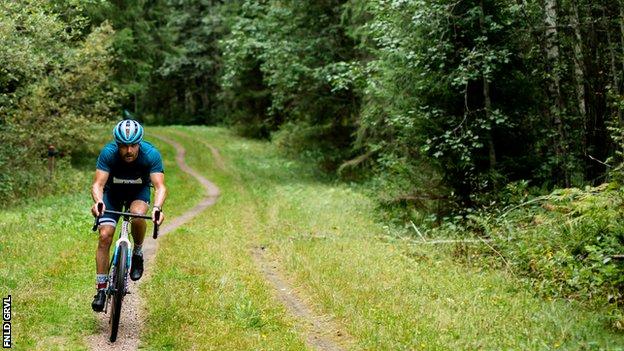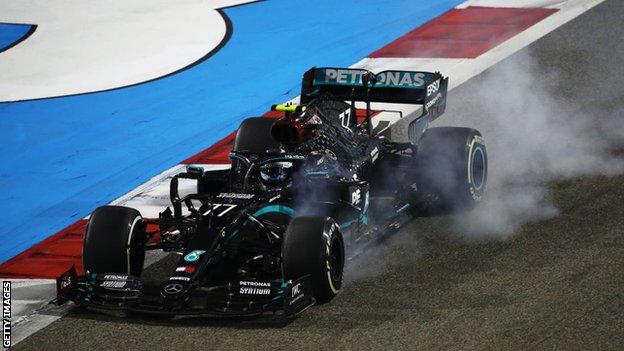Mexican Grand Prix: Valtteri Bottas on his new bike race and climate concerns


There’s a simplicity to the thick forests and endless lakes of Finland – which are a source of great pride to its people.
You can see that in Valtteri Bottas’ eyes when he talks about the sense of calm they bring to him.
That geography is why so many of the Finnish sporting greats, such as Juha Kankkunen and Kimi Raikkonen, find their way into motorsport – forced as they are to drive a car from a pre-legal age just to get around.
But less so Finland’s current number one driver, who began life getting across southern Finland’s unforgiving parcours on a bike.
“My daily commute to school, even if it was snowing or raining or whatever, was by bike,” says Bottas.
“For me it was a normal commute, so I didn’t find it that hard – I got used to it and the wet weather.”

The gravel revolution
Bike first: it’s a message so many of us in towns and cities across the world are acclimatising to these days.
And Bottas, 33, a man who has burned his fair share of fossil fuels in winning 10 Formula 1 races for Mercedes, has joined the revolution: falling in love with gravel racing – a craze of taking drop-handle road bikes with more gears and fatter tyres and blazing across the dirt roads of the world.
There’s a even a world championship, this year’s men’s race was won by Belgium’s Gianni Vermeersch, while Ineos Grenadiers’ new signing Pauline Ferrand-Prevot of France took the women’s title.
“Gravel racing is something that’s been really rapidly growing, getting more and more popular especially in the United States,” says Bottas.
“I did my first gravel race last year in Steamboat Springs – SBT GRVL [near Denver, Colorado]. Most people go mountain biking and road cycling, but it just gives you the opportunity to explore a bit more – get on roads without any traffic or without any people. That’s the pretty cool thing about it.”
So cool, he has launched his own race for next year – FNLD GRVL, set across the very same natural phenomenon where he grew up around Lahti – a Finnish city of 120,000 people, and one which has chosen Bottas as an ambassador to affect change to preserve its surroundings.
“I try to get involved in some of my passions – nature, cycling, and another one is coffee… no doubt good there’ll be good coffee in the race.
“I like to reward myself after a ride with a beer or a gin and tonic, so that could be an opportunity. I think there’s going to be a few things linked to the event I’m involved with that I have a passion for.
“It’s quite common for people [in gravel cycling] to have camp fires and cook some marshmallows or something, but the nature in Finland is something we will try to make accessible for people to explore – then maybe have a sauna or go swimming straight after race.”
But another catalyst for his passion for two wheels comes from his partner, professional cyclist Tiffany Cromwell, who also races on gravel – she was sixth in the aforementioned worlds – when she’s not on the road for Canyon-Sram on the Women’s World Tour.
Bottas continues: “With [car] racing when I started training more systematically, cycling was always one part of cardio for me. But when I met Tiffany my cycling game went up to the next level, I would say, and the interest as well.”
The pair operate out of Monaco now – where the shops are “70 metres away – job done”. But when they are on the move, it’ll usually be on the bikes.
“When I do a hard training session or even a race I do it mainly for fun to challenge myself. I kind of like to push myself to the limit. If you do even like a two or three-hour gravel race and you spend most of the race at your max heart rate… it’s quite painful so it’s something that makes you tougher in a way. It really is a sport that allows you to push even further that you thought you can go. It’s quite satisfying.”
Freedom, but for how long?
But it’s not just the physical benefits of cycling which really capture Bottas’ imagination.
“For me it’s a bit of a stress release,” he says. “I can go to places that are quite remote, I can go to explore and almost leave any stress or F1-related things behind me when I get on my bike.
“For me it’s mentally really important. I love nature and I love clean air, pure water, nice scenery – the less people you can see the better when I disconnect.”
Ah, yes, the uncomfortable truth. Bottas races for Alfa Romeo these days, in a sport which creates around 256,000 tonnes of carbon equivalent waste each season.
Not that professional cycling is necessarily in any better shape: governing body the UCI is still yet to register any true figures on the carbon footprint of a sport which often requires several helicopters and an endless stream of cars and motorbikes.
Bottas knows all this. And, like many others, it’s affecting him.
“I’ve definitely seen climate change in Finland – already the summer and winter is turning more in extremes. Already from my childhood to now I can see a difference.
“Some places in Finland have become really windy, and it was not like that 20 years ago.”
Bottas is determined that his presence in F1 and now in cycling will affect positive change in both sports and beyond.
“Being in F1, there’s quite a big push to be greener – it took a while, but finally people are taking it seriously. Teams and organisations are really putting effort into it.
“I will definitely try to do my best with this event – in the end it’s all about making simple choices, like if you go to work or to the supermarket; do you take your V8 car or bike? Simple things.”
